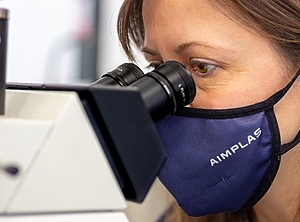MICROPLASTICS
Spanish project to develop new methodology for detecting microbeads in industrial processes
 Microplastics are characterised as plastic fragments of 5mm or less (Photo: Aimplas) |
Spanish plastics technology centre Aimplas (Valencia; www.aimplas.net) is working with several companies located in the Valencia area to develop new methodology for analysing microplastics. The project, called Microplastics_2020, aims to create standardised methodologies that will enable companies to detect, identify and quantify the presence of microplastics in industrial processes and take action to prevent their release into the environment.
Microplastics are characterised as plastic fragments of 5mm or less and there are currently no standard methodologies available to analyse their presence in various processes, as well as in generating industrial effluents.
At present, said Aimplas, companies have to ask experts at highly specialised centres to perform this type of analysis, because the level of technology and knowledge required is very high. “Thanks to this project, companies will have a greater capacity to take action on their materials and processes to reduce the possible presence and production of microplastics, and they will be better prepared to anticipate future legislation,” the technology centre said.
The companies working with Aimplas on the project are bottled water firm Agua Mineral San Benedetto (Valencia; www.sanbenedetto.es), water management group Global Omnium (Valencia; www.globalomnium.com) and Spanish waste management company Acteco (Alicante; www.acteco.es). In a project to develop methods for recycle artificial turf in Spain, Aimplas is also in collaboration with Acteco (see Plasteurope.com of 17.02.2021).
The Microplastics_2020 project is funded by the Valencian Institute of Business Competitiveness (IVACE, Valencia; www.ivace.es) and the European Regional Development Fund (ERDF, Brussels / Belgium; www.ec.europa.eu/regional_policy/en/funding/erdf). In 2019, Aimplas had launched another microplastics-related project to develop a standardised methodology to detect microplastics at wastewater treatment plants (see Plasteurope.com of 16.08.2019).
Microplastics are characterised as plastic fragments of 5mm or less and there are currently no standard methodologies available to analyse their presence in various processes, as well as in generating industrial effluents.
At present, said Aimplas, companies have to ask experts at highly specialised centres to perform this type of analysis, because the level of technology and knowledge required is very high. “Thanks to this project, companies will have a greater capacity to take action on their materials and processes to reduce the possible presence and production of microplastics, and they will be better prepared to anticipate future legislation,” the technology centre said.
The companies working with Aimplas on the project are bottled water firm Agua Mineral San Benedetto (Valencia; www.sanbenedetto.es), water management group Global Omnium (Valencia; www.globalomnium.com) and Spanish waste management company Acteco (Alicante; www.acteco.es). In a project to develop methods for recycle artificial turf in Spain, Aimplas is also in collaboration with Acteco (see Plasteurope.com of 17.02.2021).
The Microplastics_2020 project is funded by the Valencian Institute of Business Competitiveness (IVACE, Valencia; www.ivace.es) and the European Regional Development Fund (ERDF, Brussels / Belgium; www.ec.europa.eu/regional_policy/en/funding/erdf). In 2019, Aimplas had launched another microplastics-related project to develop a standardised methodology to detect microplastics at wastewater treatment plants (see Plasteurope.com of 16.08.2019).
07.06.2021 Plasteurope.com [247771-0]
Published on 07.06.2021
